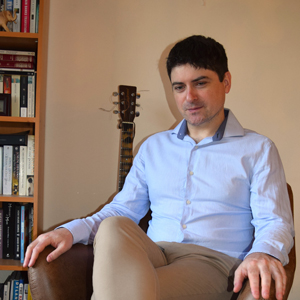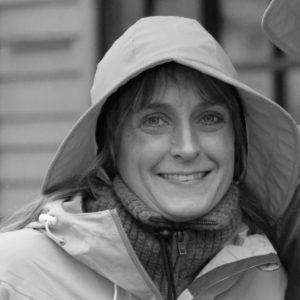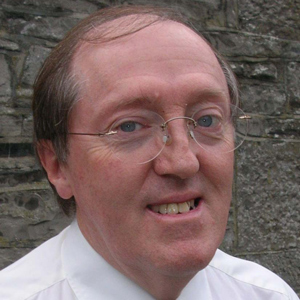Innovation in Journalism
This site provides a compilation of outstanding examples of journalism in the field of meteorology or climatology.
Conor Purcell has received the EMS Journalist Award 2021 for his article A sharper view of the world’s oceans – Models of the behaviour of the oceans with higher spatial resolution could lead to more accurate climate predictions – an example of clear and understandable science journalism in the field of oceanography and climatology. Through a well-structured narrative Purcell helps to bridge the communication gap between modern scientific achievements and the general public
Read more on Conor Purcell's work
Conor Purcell’s article in Nature is an example of clear and understandable science journalism in the field of oceanography and climatology. Through a well-structured narrative, and using the state-of-the-art in ocean modelling, Purcell helps to bridge the communication gap between modern scientific achievements and the general public. He presents different points of view on a complex topic. For instance, he takes an interesting angle by looking at ocean models and their ability to calculate the action of ocean drift. This is also being used for oil spills and maritime accidents on an operational basis. Purcell’s article raises awareness around this important application of ocean modelling.
Gripping the reader’s attention with the mystery of Malaysian Airlines flight MH370, he uses the air traffic catastrophe and the search for debris – found thousands of kilometres away – to write about ocean circulation and the possibilities around using ocean modelling. This is a welcome contribution, especially since climate models are rather abstract constructions and not easy to understand.
It is also quite impressive how Purcell covered a wide range of additional issues in oceanography, such as model parameterisation and internal waves. He addresses relevant and up-to-date topics on the challenges of ocean modelling, the role of resolution, coupling with the atmosphere, the importance of observations, as well as the link to international programmes such as CLIVAR and GOOS. Overall the article helps point out where ocean modelling and its application to climate change forecasting is headed in the future.
Short profile
Conor Purcell is a freelance science journalist and editor with a PhD in Earth Science. He is a regular contributor at The Irish Times and has also written for publications including Nature, Science, Scientific American, and New Scientist, amongst many more.
He writes mostly on Earth science – particularly oceanography, meteorology and climate – but has increasingly involved himself in writing about physics, mathematics, space and health. During his career as a researcher he co-authored on a scientific paper published in Nature, and he is currently secretary of the Irish Science and Technology Journalists’ Association (ISTJA).
Conor Purcell is also the founder of xyMaths.ie for high school Mathematics students in Ireland, the PurcellProof editing service (www.purcellproof.com), and previously the Wide Orbits community for Ideas, Issues, and Culture (wideorbits.com). In addition to his work in journalism, he is a private tutor and musician. A collection of his work in journalism can be found at cppurcell.tumblr.com.
Amanda Ruggeri, UK, has been selected to receive the EMS Journalist Award 2019 for her article “Miami’s fight against rising seas” which was published on 4 April 2017 on the BBC’s BBC.com/future website. She addresses the important issue of the impacts of climate change, and covers various aspects of the subject – environmental, social and political – while presenting different points of view through personal statements: Good storytelling and presentation of dilemmas.
Read more on Amanda Ruggeri's work
Amanda Ruggeri, UK, has been selected to receive the EMS Journalist Award 2019 for her article “Miami’s fight against rising seas” which was published on 4 April 2017 on the BBC’s BBC.com/future website:
Amanda Ruggeri is Editor, London Features and Editor, BBC Future. Her article addresses the issue of rising seas due to climate change. She presents the impact of climate change in the Miami area, focusing on various aspects of the subject – environmental, social and political. She also includes statements from people with different points of view. The article is well-documented with scientific facts but is also very extensive and detailed in terms of environmental impact. Her story on Miami brings the climate issue closer to home and shows how sea level rise is not only an issue for distant islands. She shows the seriousness and risks of the situation; at the same time it becomes obvious how the inhabitants of Miami close their eyes and continue their lives as if nothing is happening. “If one of the richest communities on the planet can’t step up, what hope is there for everyone else?” she asks.
Amanda Ruggeri is a journalist, editor, photographer, video editor and sometimes on-screen host. She is a senior journalist and Editor, London Features and Editor, BBC Future. Her specialties are in narrative and feature reporting and digital multimedia.
She is a graduate of Yale (B.A., history) and Cambridge (M.Phil, international relations) universities, and has previously worked as a political reporter in Washington, D.C.
Astrid Rommetveit won the EMS Journalist Award 2017 for her very important work in helping to bridge the gap in understanding between experts and non-experts.
She was nominated for the Journalist Award on the basis of three articles published on the popular Norwegian websites Yr.no and NRK.no between 2015 and 2017. Yr is a cooperation between NRK and the Norwegian Meteorological Institute.
Read more on Astrid Rommetveit's work
Astrid Rommetveit won the EMS Journalist Award 2017 for her very important work in helping to bridge the gap in understanding between experts and non-experts.
She was nominated for the Journalist Award on the basis of three articles published on the popular Norwegian websites Yr.no and NRK.no between 2015 and 2017. Yr is a cooperation between NRK and the Norwegian Meteorological Institute.
- Oddvar has devoted his life to the rain (29.11.2015)
- Preparing the world’s largest experiment (19.03.2017)
- Battling the contrails (02.04.2017)
Astrid Rommetveit is a Journalist with the Norwegian Broadcasting Corporation NRK (photo on the left: NRK)
As a journalist, she specializes on weather and climate, committing herself to tell important stories to a broad public. She is striving to make complex issues accessible, relevant and understandable to the readers. ‘I wan’t to show the big picture by telling “small” stories, often focusing on single persons’.
Her articles have a strong human touch combined with science, which makes them interesting to the general public. They address successfully different aspects and facts, focusing on “small” stories and single persons, using people’s statements. She provides a lively account by developing stories using people’s statements to present facts and different points of view in sometimes controversial stories.
Her chemtrails article makes it clear that the intention of the journalist is to discuss and discover, rather than pre-judge or condescend. It is of great importance to have journalists, such as Rommetveit, who is willing to cope with the facts without using false balance to give a misleading impression of objectivity.
All articles are well-structured, well-written, easy to read, with relevant images, and well-documented with scientific facts. They help bridging the communication gap between scientific achievements and research results and the public, presenting different points of view for complex topics.
Read more on Stéphane Foucart's work
Stéphane Foucart was selected for the EMS Journalist Award 2015.
He regularly publishes articles on the environment and climate change in the “Planet” section of “Le Monde”. He was nominated for the Journalist Award on the basis of three articles published in “Le Monde”:
- One third of sea level rise is due to melting of high altitude glaciers (Le Monde, Planète, June 2013) – translated into English
- The climate and war (Le Monde, Planète, November 2014) – translated into English
- Climate and the trade of doubt (Le Monde, Planète, March 2015) – translated into English
In his articles, Stéphane Foucart is addressing climate change and its social and environment impact, highlighting the different aspects (e.g. in the context of history and politics) and reporting the recent scientific facts, while keeping a high level of objectiveness.
He is vigilant to detect and expose misleading information about climate change and he is reporting in an understandable way the scientific facts about the environment, the climate and also about climate change in the context of politics. These implications of climate and climate change are rarely addressed by meteorologists or climatologists, but are of utmost importance. Foucart adds to the scientific facts the perspective of a competent journalist, placing climate change into a broader frame. This is an impressive work.
Stéphane Foucart has been working for “Le Monde” for 15 years now, and he is the journal’s environmental sciences correspondent since 2007. He is also the author of books investigating the corporate influence on science (Le Populisme climatique, 2010, and La Fabrique du mensonge, 2013).
John Sweeney won the first EMS Award for Achievements in Journalism in 2014. John Sweeney is Emeritus Professor at the Irish Climate Analysis and Research UnitS (ICARUS) at the National University of Ireland Maynooth. For the past few decades he has been the main communicator of information about climate change, extreme weather and other meteorological information to the Irish public through all forms of journalistic media.
Read more on John Sweeney's work
John Sweeney won the first EMS Award for Achievements in Journalism in 2014. John Sweeney is Emeritus Professor at the Irish Climate Analysis and Research UnitS (ICARUS) at the National University of Ireland Maynooth. For the past few decades he has been the main communicator of information about climate change, extreme weather and other meteorological information to the Irish public through all forms of journalistic media.
See some examples of his interviews and articles:
- Looking Back and Looking Forward: Newspaper article dealing with aspects of the extremely cold winter 2010/2011 in Ireland (appeared in Sunday Business Post)
- John Sweeney warns about climate problems on National television news bulletin (RTE Ireland)
Considerations which are important when communicating messages relating to climate change – by John Sweeny:
- Tailor your message to the target audience concerned.
- A communication with a broadsheet newspaper is very different to a soundbite on local radio. Although the temptation is to impress one’s peers with the former, for the latter it is important to express a message more directly, without equivocation. This is much more difficult than often appreciated, but essential if the message is to hit home.
- Decide in advance what the key message is and do not be deflected from this.
- Interviewers vary enormously. Some are well versed in the science, others are not. Questions may therefore appear lightweight, rather populist, and not what you have anticipated. If necessary the question should be used as a general platform only to convey your intended message.
- Avoid misplaced ideas of professional and academic ‘snobbery’
There are professional atmospheric scientists who look down on those who participate in media activities, considering them to be ‘pseudo’ scientists who betray scientific purity and excessively simplify its complexity. There is no justification for this, such are the major problems global society faces. In many areas atmospheric scientists can, and must, make key contributions. Journalism and media activities by young atmospheric scientists requires particular courage in this area and must be strongly supported.






